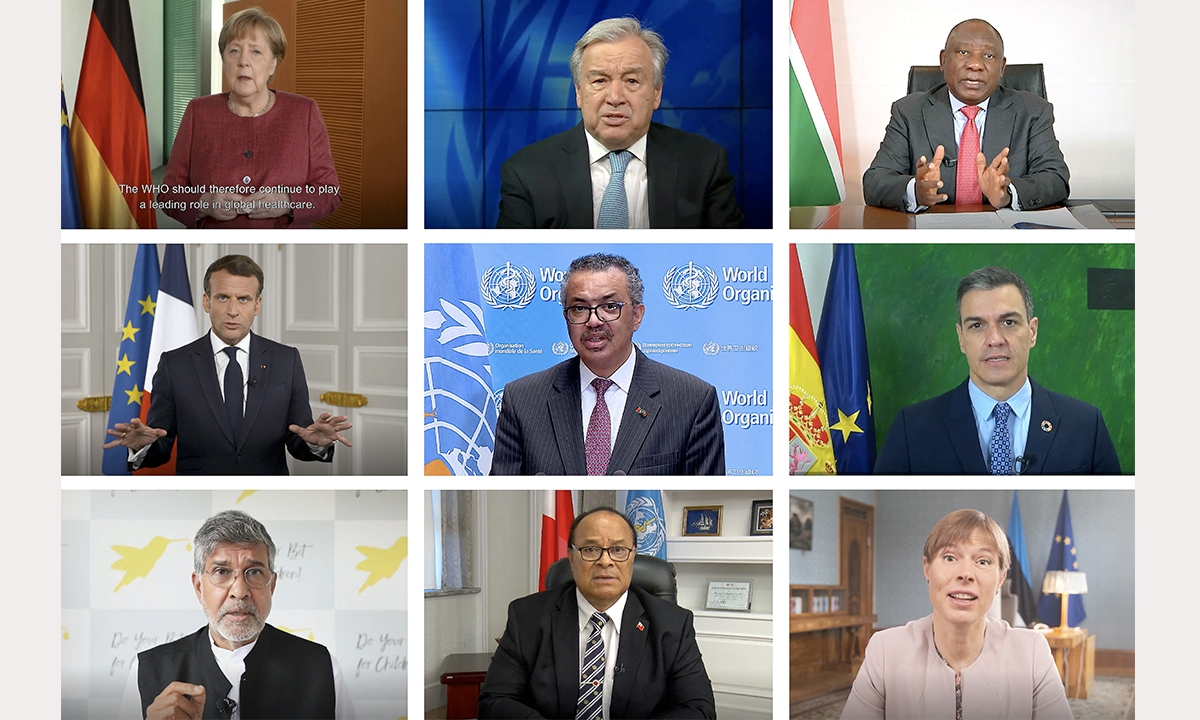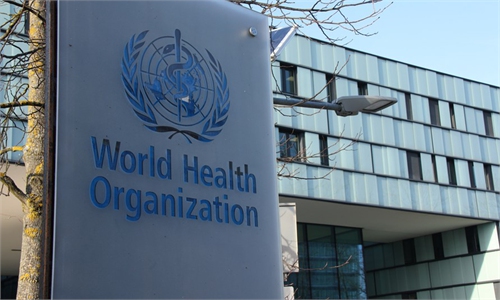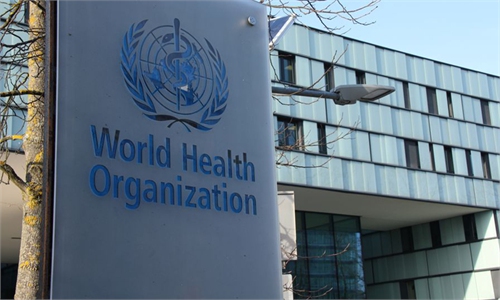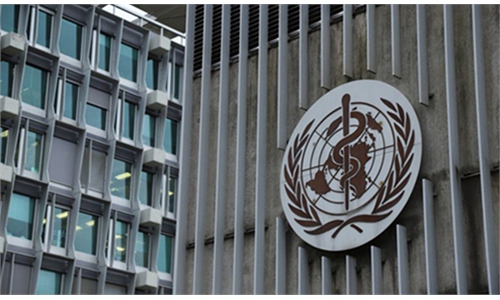WHA starts, vowing to end vaccine ‘scandalous inequity’
US hypes lab leak theory again; global origins study ‘urgent’

A combination of nine screenshots taken from a handout video made available by the WHO shows several world leaders, as well as UN Secretary-General Antonio Guterres (center in 1st row) and WHO's Director-General Tedros Adhanom Ghebreyesus (center in 2nd row) addressing remotely at the opening day of the World Health Assembly on Monday in Geneva. Photo: AFP
While the world is struggling to end the COVID-19 pandemic that has changed people's lives in the most dramatic way, with over 167 million infections and over 3 million death toll until now, the 74th World Health Assembly began on Monday. Considered to be the most pivotal one in its history, the event covers a number of crucial topics including WHO reforms, vaccine equity and a potential pandemic treaty.
Scheduled from Monday to June 1, delegations from 194 member states will meet virtually to discuss how to make the World Health Assembly (WHA) - the highest decision-making body of the WHO - much better prepared and efficient in confronting the next pandemic. When the pandemic still rages on and the global response and cooperation are at a critical stage, the US intelligence community, media and officials began stirring up another wave of public opinion with a repeatedly hyped topic: the lab leak theory about the origins of the coronavirus. In the eyes of Chinese public health experts and officials, such an ill-intentioned move of hyping groundless claims is purely out of the political purpose for shifting the blame to cover up its own failure in handling the epidemic.
Just hours before the WHA session began on Monday, the Wall Street Journal ran a story, citing an undisclosed US intelligence report, indicating that three researchers from the Wuhan Institute of Virology became sick in November 2019, with symptoms consistent with both COVID-19 and common seasonal illnesses.
In fact, experts from the WHO-China joint team, the senior researcher from the institute and officials from the Chinese Foreign Ministry have already refuted the so-called "lab leak theory" on the question of the origins several times. Yuan Zhiming, director of the institute's Wuhan National Biosafety Laboratory, called the story "an outright lie that came from nowhere."
Given the return of Washington to the WHO under the Biden administration, such shift-the-blame tactic is also often interpreted as playing down the leadership of China - the first country that contained the outbreak and is also a frontrunner in mass vaccination - within the international body on public health, according to some experts.
An expert from the China-WHO joint team acknowledged that the latest WSJ report is purely political, which echoed some analysis about the US government's attempts of further smearing China's efforts in anti-epidemic fight.
Meanwhile, as the global scientists are still striving to learn more about the virus itself, Chinese officials and experts considered that the next stage of origins studies on the global scale beyond China is as urgent as fair vaccine supply, especially when the earlier cases remained mysterious. And as an important WHO member, the US should uphold an open attitude toward origins-tracing work.
Highlighting key issues
"Since our WHA74 started this morning, almost 1,000 people have lost their lives to COVID-19, and in the time it takes me to make these remarks, a further 400 will die," Tedros Adhanom Ghebreyesus, the director-general of the WHO, said at the opening session, highlighting the sheer gravity of the pandemic.
"We must be very clear, the COVID-19 pandemic is not over, and it will not be over until and unless transmission is controlled in every last country," he said, calling for increasing equitable access to vaccines, with over 75 percent of all vaccines being administered in just only 10 countries.
What lessons has the world learnt from the pandemic? Although China had successfully contained the outbreak as quickly as possible in 2020, it has not relaxed its vigilance in fending off imported cases, at the same time, the country has been pushing the world's largest vaccination campaign by administering millions of doses every day. However, countries like India are still struggling amid surging daily infection cases which are overwhelming the public health system amid a lack of vaccines.
"The COVID-19 pandemic has warned the world that infectious diseases have no borders, especially in such a world of close international exchanges," Wang Guangfa, a respiratory expert at Peking University First Hospital, told the Global Times on Monday.
China has served as an example in tackling a sudden public health crisis as the country decided to quickly prioritize epidemic prevention and control over economic benefits in the early stages of the pandemic, winning more space for development after the epidemic has been fully controlled, Wang said.
On the contrary, some Western countries misjudged the situation when China struggled with the virus and wrongly insisted on prioritizing the economy as an anti-epidemic strategy, Wang said.
To win this war against the virus, the world needs more collaboration and unity. However, the ongoing vaccine crisis is "scandalous inequity" and aiding the pandemic's scourge, according to the WHO chief.
Global demand for COVID-19 vaccines could range from 10 to 14 billion doses in 2021 depending on the final aspired coverage rate, need for re-vaccination and boosters, according to a previous report from the WHO in March. There is currently large geographic variability in announced deals and demand, with an estimated 70 percent of the world's total population needing to be vaccinated to build herd immunity, the report said, noting that thus, it requires 11 billion doses of a two-dose regimen.
However, what is even more scandalous in the eyes of some Chinese observers is certain countries and politicians continuing to politicize the pandemic, which will further obstruct joint efforts among countries in this fight, especially when human beings still have limited knowledge about the virus itself.
Global tracing needed
For Chinese scientists and officials, it's clear that the question of the origins has been hyped by US officials for the political purpose of pressuring China, and a so-called independent study on the pandemic response is scheduled to be presented at the WHA session, with the study finding that the WHO was underfunded and underpowered with a global alert system that was too slow and ineffective.
The US has been calling for a so-called independent study on the origins of the virus, when the WHO expert team had visited a number of places including the Wuhan Institute of Virology, the biosafety labs and related institutes, they drew a conclusion that the lab leak theory was "extremely unlikely."
Chinese officials and experts called for closer international cooperation to tackle future global public health crises, including cooperation on the tracing of the origin of the virus and the allocation of anti-epidemic materials.
There have been more reports indicating that the virus and resultant pandemic had occurred in many places as early as the second half of 2019, and questions over the US' military lab in Fort Detrick as well as the US' real intention of opening more than 200 bio labs around the world have also drawn global attention, Chinese Foreign Ministry spokesperson Zhao Lijian told a press conference on Monday.
"The US continues to hype the lab leak theory. Is it really expressing concern over the virus origin or diverting attention?" he asked.
Besides the US intelligence and media hyping the lab leak theory, the US' top epidemiologist Anthony Fauci appeared to change his rhetoric on the subject, sparking more speculation about the Biden administration's future moves of politicizing the virus origins.
Fauci told a Poynter event earlier this month that he was not convinced that the virus developed naturally, saying we should continue to investigate what went on in China, the New York Post reported on Sunday. However, last May, the US scientist said in an article in the National Geographic that there was "no scientific evidence the coronavirus was made in a Chinese lab."
A source close to the China-WHO expert team who preferred not to be identified told the Global Times on Monday that it is likely the US brought this topic up for the ongoing WHA and we should prepare for it to politicize it in the long run.
"Previous evidence has shown that the virus could have existed in certain places long before the outbreak in Wuhan. Investigations in these places are needed and further studies are required to find out why these places failed to detect the virus before the Wuhan outbreak," Wang noted.




